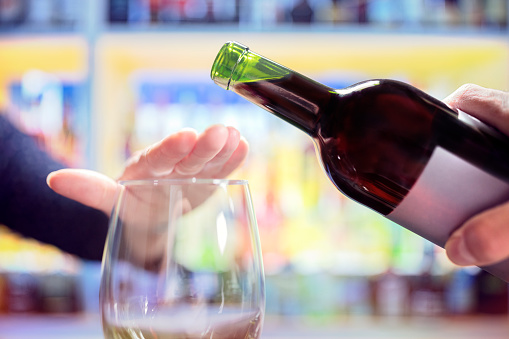
Alcohol is a common substance you may turn to when needing to regulate emotions. While many people correlate the consumption of alcohol with a negative emotional state, the truth is that you can reach for alcohol whether you are experiencing good or bad feelings. There are times when you may turn to alcohol to celebrate positive experiences. Other times, alcohol may become a way to cope with difficult emotions, as alcohol can serve as a numbing agent that makes you feel “less” or distracted from what is going on in your life. Your alcohol use might feel like it is helping you to get through when, in actuality, you are sabotaging yourself, your goals, and even your life.
Many factors can determine how your relationship with alcohol is impacting your life. If you are suffering severe consequences but still feel unable to stop drinking, you may be struggling with alcoholism. Alcoholism can manifest for many different reasons, such as social, environmental, genetic, and psychological factors. Understanding what alcoholism is and why you turn to it as a coping mechanism can help you take a stand against it.
What is Alcoholism?
Alcoholism is a dependence on alcohol that can manifest in various ways. The dependence itself can be mental or emotional but can also become physical over time and/or with

enough overuse. You may identify an unhealthy relationship with alcohol for yourself, or you might have loved ones voice their concerns to you. Wherever you are in your exploration of your alcohol use and/or abuse, there are specific symptoms you can consider. Some signs of alcoholism include:
- Being dependent on alcohol to the point where you cannot control your drinking.
- Experiencing thoughts that are focused only on alcohol.
- Continuing to drink despite any health, mental, physical, or life problems that may occur.
- When attempting to stop, a physical inability to cease use and/or will have withdrawal symptoms.
The physical dependence on alcohol can be very serious; cessation should not be attempted without medical support and/or supervision if you experience physical side effects when your alcohol levels drop. Detoxification from alcohol can include shakes and tremors, auditory and visual disruptions/hallucinations, dehydration due to excessive sweating, and seizures.
3 Reasons You Turn to Alcohol
Trauma: Experiencing trauma can heighten the chances of developing an alcohol use disorder. Using alcohol is often used as a coping mechanism for trauma-related symptoms, whether

they may be physical, emotional, or mental. Numbing your trauma-related stress is often the goal of drinking for these individuals. Statistics show that most people addicted to substances suffered abuse and/or trauma in childhood. When we look at people struggling with addiction, we must bear in mind that most of the people we are talking about were dealt a hand that they should have never had to conquer. There will be loss, grief, heartbreak, and tough times throughout our lifetimes. Anyone who suffers additional trauma beyond that is particularly vulnerable to seeking emotional regulation and comfort through substances.
If you turn to alcohol when experiencing negative emotions, you may be engaging in a pattern that has gone on for decades. Your alcohol intake may be part of a pattern of responses. Perhaps, when you were a child, you played rough sports to get out your aggression or had a self-soothing relationship with food. You may have utilized whatever you had access to and discovered alcohol as the next logical step in your quest to feel better. In the case of alcohol, there can be severe repercussions involving your safety, the safety of others, your ability to thrive in your life, your ability to function, and your mental and physical health. These things are impacted because alcohol impairs judgment, depresses the nervous system, dehydrates the body, and more. However, alcohol itself isn’t a standalone problem when it is being used as a coping mechanism for trauma. The trauma itself is the issue, and healing it is a significant step in dealing with your alcoholism.
When we look at therapy for addiction recovery, it is not all about simply abstaining from using your drug of choice. It is about unpacking the reasons you feel you require alcohol in the first place. Our therapy practice in Woodland Hills sees patients of all ages seeking to heal from trauma and move forward mindfully. Therapeutic practices such as Cognitive-Behavioral Therapy (CBT) can allow you to identify the triggers that lead to drinking. Identifying these cues and learning to manage stress can help you avoid the situations that cause you to reach for alcohol as a solution.
Healing from trauma can be a lifelong pursuit that requires revisiting treatment and re-evaluating how you are feeling and how you are processing negative emotions and triggers. Managing your emotional distress long term can help you to abstain from alcohol abuse, as well as improve other areas of your life that are impacted by the trauma you have endured.
2) Mental health problems:
Individuals who suffer from mental health issues such as anxiety, depression, schizophrenia, or bipolar disorder are at higher risk of turning to alcohol when under stress. These individuals can become dependent on

alcohol and develop an alcohol use disorder alongside their mental health disorder. Sometimes, alcohol has been used as a self-soothing measure before diagnosis; other times, not. However, long mental health issues and alcohol abuse coexist; they can very quickly become intertwined.
Because alcohol is a depressant, it is a very tempting method for curbing (or even eliminating) feelings of anxiety. When the central nervous system depresses, it creates a sense of relaxation that can be difficult to say goodbye to without properly managing the remaining anxiety. Being anxious is uncomfortable, which means that we will seek to avoid it at all costs. Unfortunately, excessive alcohol use creates more anxiety in the long run, as health-supportive habits are harder to maintain, and ramifications from alcoholic behaviors begin to pile up.
Depression that is treated with alcohol can feel especially precarious, as depressing your nervous system when you are already low is dangerous for your physical and mental health. If you are so mired in a depressive episode that you can’t get out of bed and you add alcohol to the mix, then your breathing and heart rates can plummet along with your mood. However, these logistics aren’t on your mind when you struggle with depression. In that state, you want to reach for something that will make you forget, care less, and feel “calm” about what you’re experiencing. If you struggle with depression, you may also reach for alcohol when you feel happy and good because you want to “celebrate” and “keep the good times going.” However, using a depressant in this manner will not sustain your stability but, in fact, jeopardize it.
As with most mental health issues, having a routine that supports sleep, nutrition, and hydration is the foundation of managing your symptoms. Alcohol use disrupts all three of these key health habits. It then also disrupts mental and physical health work due to feeling unwell or scrambling to catch up on tasks that went by the wayside when drinking. Addiction recovery involves finding where alcohol exacerbates other existing mental health problems and where those problems exacerbate alcohol addiction.
Any treatment for underlying mental health issues and/or disorders will be beneficial when it comes to treating alcohol dependence. Tools utilized in treatment include therapy, medication, and/or group support. Some medications create extreme adverse effects when used with alcohol. This is why alcohol use is important to disclose to anyone who may prescribe a medication for you and why sometimes you must attain sobriety before being properly treated for anxiety, depression, bipolar, or schizophrenia, among other mental illnesses.
3) Environmental factors:

If you are surrounded by people who consume alcohol on a regular basis and in large quantities, your likelihood of drinking increases naturally. Given the fact that today’s drinking culture has accessible alcohol everywhere, this becomes even more difficult. The truth is that you might enjoy going out for drinks and want to drink when you are feeling happy and excited about your life. Peer pressure is another factor that plays a role in developing an alcohol use disorder due to the fact that you are more likely to drink if your friends or family are pressuring you to drink.
These pressures may not be as overt as you might imagine. When we are young and taught about peer pressure, the examples we see are often belligerent harassment and name-calling if you don’t go along with what you’re being told to do. As we get older, we begin to realize that pressure comes in more subtle forms as well: being the only person not participating; the discomfort of others when we decline a drink; a drop in invitations to events that include alcohol; a pause in conversation when sobriety is mentioned. Those we are close to may struggle to offer us a smile and a shrug and an alcohol-free alternative, causing distress to us as we see them fumbling for the right thing to say or hide their disappointment. These subtle cues can create feelings of guilt on top of our existing anxiety at having to decline to drink in the first place.
Establishing the boundary of sobriety is something that has to happen over and over again. Any time you make a new friend, go on a date, attend a work function, etc. The prospect of a lifetime of declining alcohol can feel daunting. This is why having a support network of sober folks upon whom you can depend is so important. Ideally, you can make sober and/or sobriety-supportive connections in your daily life. All it takes is one person at each event to have your back. This might be someone who also abstains from alcohol, and the two of you can decline as a team. It may be someone who does consume alcohol, and you can use the excuse of being their designated driver, even if they don’t end up needing one. If you cannot find that person in real life or don’t always have access to them, you can communicate with a network of your choosing when you need to.
Preparing for social events where there may be alcohol involved can include communicating with sober supports in advance, designating a contact person to be available via phone during the event, and even having someone to talk to afterward, depending on what works best for you. The key in these social environments is to remember that you are not the only person in the world who says no to a beer, even if it feels like that at the moment.
If you find that you cannot receive support from the people in your life who are supposed to care for you and want what is best for you, you may need to move away from them, either temporarily or permanently. Sitting someone down and explaining why you have to cut ties with them can be challenging and stressful. A support person like a therapist or counselor can help you work out what to say and provide space to unpack your conversation afterward.
Whether you want to consume alcohol when you are experiencing good feelings, bad feelings, or both, the issue isn’t necessarily going to be the alcohol itself. Instead, it will be its impact on you and

why you’re utilizing it in the first place. If you can’t let good times be good without alcohol, and/or you feel you need alcohol to help you when you are feeling distressed, that isn’t a sustainable relationship with a substance. Sometimes, people are happy to have a glass of wine to toast a milestone but would be just as happy toasting without it. That is a healthy way to interact with alcohol. Sometimes, people drink more than they planned to and wake up hungover and disappointed; these things happen to alcoholics and non-alcoholics alike. The difference is that someone without an alcohol dependence will experience negative repercussions and immediately and easily make a plan to adjust for the future, which may include not drinking for a while or simply being more careful next time. After this revelation, they will stick to their plan without feeling anxious or like they’re missing out on anything. If the idea of abstaining from alcohol feels distressing, seems impossible, or has proven impossible for you, you may want to seek a change, whether you attend a program, join a support group, begin therapy, or all of the above. This is a step that you have to want to take; no one in your life can force you to examine, evaluate, and adjust your relationship with alcohol. You have to want to make that change to live a happier and healthier life, the life you deserve.
Therapy for Addiction Recovery that actually works!
Here at Embracing You Therapy group practice, our therapists invite you to explore your relationship with addictive behaviors, whether that is a substance or an activity, and define how life would be different if you had more control over your unhealthy behaviors. We believe that it is possible to make changes in your life, get a hold of your destructive behaviors, and find the right tools to feel peace in your life.
Contact us today for your complimentary 20-minute phone consultation with our Client Care Coordinator.




